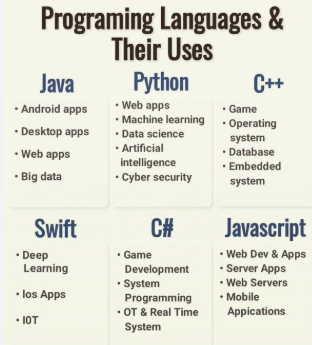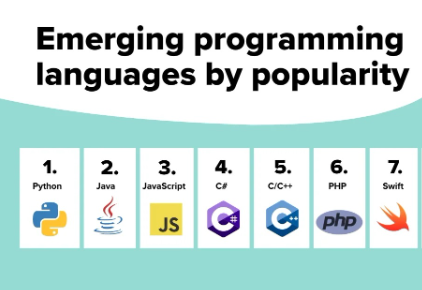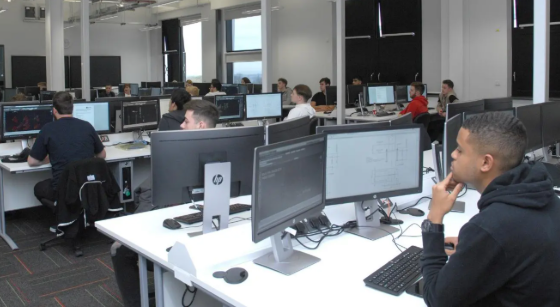
Top Programming Careers and the Languages They Use
If you’re learning to code and wondering where it can lead, this guide is for you.
Whether you want to build websites, analyze data, or develop apps, each career path uses different tools—and different programming languages.
In this post, you’ll learn about the most in-demand programming careers, what they actually do, and the languages and skills needed to get started.
1. Web Developer (Front-End)
What they do:
Build websites and interfaces that users interact with directly—buttons, menus, layouts, and visuals.
Languages Used:
- HTML – Page structure
- CSS – Styling and layout
- JavaScript – Interactivity
- Frameworks: React, Vue, Angular
Tools: VS Code, GitHub, Figma
Related: Front-End vs Back-End Programming Explained
2. Back-End Developer
What they do:
Handle everything behind the scenes—databases, servers, APIs, and logic.
Languages Used:
- Python, PHP, Node.js, Java, Ruby
- SQL for database queries
Tools: Postman, Docker, Git, Django, Laravel
Related: Python vs JavaScript | Which One Pays More in 2025?
3. Full-Stack Developer
What they do:
Build both the front-end and back-end of web applications.
Languages Used:
- Front-end: HTML, CSS, JavaScript
- Back-end: Python, PHP, Node.js, SQL
- Popular stack: MERN (MongoDB, Express, React, Node.js)
Tools: Git, GitHub, VS Code, APIs
Tip: Start with front-end, then move into back-end to become full-stack.
4. Mobile App Developer
What they do:
Create apps for smartphones and tablets—iOS and Android.
Languages Used:
- Java / Kotlin (Android)
- Swift (iOS)
- JavaScript + React Native (cross-platform)
- Flutter (uses Dart)
Tools: Android Studio, Xcode, Firebase
Bonus: Learn cross-platform frameworks if you want to build once and deploy everywhere.
5. Data Analyst
What they do:
Interpret data to discover patterns, insights, and trends.
Languages Used:
- Python (with Pandas, NumPy, Matplotlib)
- SQL for querying databases
- R for statistical analysis
- Excel and visualization tools (Power BI, Tableau)
Tools: Jupyter Notebook, Excel, Google Sheets
Related: What Is SQL? | Databases and Data Handling Made Easy
6. Machine Learning / AI Engineer
What they do:
Build systems that can learn from data—like recommendation engines, image classifiers, or chatbots.
Languages Used:
- Python (TensorFlow, PyTorch, Scikit-learn)
- R (for statistics and modeling)
- SQL for data extraction
Tools: Jupyter, Colab, Anaconda, ML libraries
Career Outlook: One of the fastest-growing fields in tech.
7. Cybersecurity Analyst
What they do:
Protect systems, networks, and data from security breaches and cyberattacks.
Languages Used:
- Python (scripting & automation)
- Bash, PowerShell (command-line tools)
- Some C/C++ for low-level vulnerability research
Tools: Kali Linux, Wireshark, Metasploit
Tip: Learn networking and operating systems alongside programming.
8. DevOps Engineer
What they do:
Automate and manage code deployment, testing, and server infrastructure.
Languages Used:
- Python, Bash, Go
- YAML (for config files)
- Scripting in Shell, PowerShell
Tools: Docker, Kubernetes, Jenkins, AWS CLI
Goal: Make code go from dev → test → production fast and safely.
9. Game Developer
What they do:
Create video games—from mobile apps to console and PC games.
Languages Used:
- C++ (for game engines like Unreal)
- C# (for Unity)
- JavaScript (for web-based games)
- Python (for beginner-level games or AI in games)
Tools: Unity, Unreal Engine, Godot, Blender
Related: C++ Explained Simply | Should You Still Learn It?
Quick Career-Language Reference Table
| Career | Primary Languages |
| Web Developer (Front-End) | HTML, CSS, JavaScript |
| Back-End Developer | Python, PHP, SQL, Node.js |
| Full-Stack Developer | JS, Python, SQL, more |
| Mobile Developer | Java, Swift, React Native |
| Data Analyst | Python, SQL, R |
| ML/AI Engineer | Python, R, SQL |
| Cybersecurity Analyst | Python, Bash, C |
| DevOps Engineer | Python, Bash, Go |
| Game Developer | C++, C#, JS |
Final Thoughts
Choosing a programming career depends on what excites you most:
- Love visual design? → Try front-end
- Love data and logic? → Go for back-end or data roles
- Want to build apps? → Mobile or full-stack
- Interested in AI or games? → Python or C++
No matter where you start, learning to code opens doors to exciting, high-paying careers in tech.


